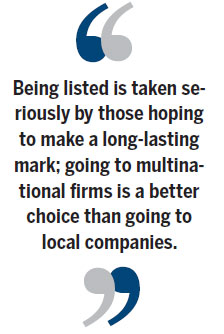Multinational consultants not old hat
Updated: 2014-06-06 08:10
By Robert Parkinson (China Daily Europe)
|
|||||||||||
The idea that only locals have solutions for China's market overlooks expertise of international firms
Having served in international consulting businesses for more than 20 years, Edward Tse, the former chairman of Booz & Company Greater China, made the decision to establish his own company, Gao Feng Advisory, in April.
His wide experience in consulting has made him believe that multinational management consultancy companies with a US background no longer have solutions to Chinese companies' problems. He insists that these companies' DNA is locked into the United States. Dealing with the complexity of Chinese markets, they are in a weak position. However, it is quite unfair to make such statements if Tse talks only about the disadvantages of international consulting in the Chinese market.
To start with, I would like to talk about multinational consulting companies' absolute advantage in helping Chinese companies "going abroad". To make my point clear, let me cite the case of New Oriental.
In 2006, when Michael Yu decided to get New Oriental listed on Nasdaq, he was lucky to get the entire application document approved very quickly. The reason was that a few years ago, New Oriental began doing consulting work with PricewaterhouseCoopers and Deloitte. In this regard, the question becomes who "knows the US Securities and Exchange Commission better, Chinese consulting firms or international consulting agencies?"
Back to the Chinese market, a number of promising Chinese private enterprises have developed rapidly during the past decade. Being listed is taken very seriously by those hoping to make a long-lasting mark. Therefore, going to multinational consulting firms is a better choice than going to local companies.
The second strength of such international firms is their expertise and professionalism in organizational structure. All companies start with a small group of people. But because the needs of clients and customers change and develop from time to time, companies find it difficult to maintain the same organizational structure as they add more employees.

In the case of Chinese companies, building up a company is not about hiring as many talented people as possible and keeping them around with petty favors. That won't work if eight bosses come around to harangue them if they make a mistake, or if creative ideas they develop take three months to reach the desk of the big boss.
Without the right organizational structure, a company can never be successful. On that point, most international consulting agencies have lots of hands-on experience. Famous foreign consulting companies such as BCG, Strategy&, McKinsey and Bain are all expert at organizational structure. International consulting agencies can be very helpful in setting up the right models to meet the needs of Chinese companies.
Lastly, when it comes to the recruitment, most multinational company clients of RMG Selection in the field of consulting come to us for help in recruiting qualified Chinese employees instead of foreign staff. Take BCG as an example. On the website of "BCG people", instead of foreign faces there are seven Chinese managers on the page. They either have overseas educational backgrounds or have a good understanding of the Chinese market. It's the same with other international consulting firms with offices in the Chinese mainland.
Of course, there are expat managers in these offices, but the majority of the workforce in China is local. I can hardly agree with Tse that these consulting firms do not understand the complexity of the Chinese market. Excellent Chinese market analysts educated in economics understand how the market works and what Chinese clients need to improve.
Having talked so much about the advantages of multinational consulting firms, I do need to clarify that I do not mean Chinese consulting firms are not competitive. International firms often envy their good understanding of the Chinese market and great people skills. The validity of Tse's opinions depends on where he draws the line between the two.
The author is CEO and founder of RMG Selection.
(China Daily European Weekly 06/06/2014 page9)
Today's Top News
China finds way to play in 2014 World Cup
Protocol targets sex violence
Premier all business on Europe trip
Poland-China train on maiden trip
Iraq facing 'mortal threat' from militants
China, Italy boost ties
Brazil averts strike before WCup
Red meat 'linked to cancer'
Hot Topics
Lunar probe , China growth forecasts, Emission rules get tougher, China seen through 'colored lens', International board,
Editor's Picks

|

|

|

|

|

|





